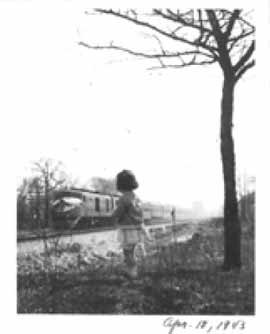 It was great to be a kid in the 1940s, at least at our house on Chestnut Street. There were so many kids on the block, everything was new and interesting, there was always time to spend with each other, we had simple play, we had our moms and dads, and everyone was so young. Even the older people.
It was great to be a kid in the 1940s, at least at our house on Chestnut Street. There were so many kids on the block, everything was new and interesting, there was always time to spend with each other, we had simple play, we had our moms and dads, and everyone was so young. Even the older people.
“You’re not old, Daddy, you’re still new.” We all were.
Special times. I have remembered them so clearly for so long, even as the world has changed around me – in small ways at first, then in large ways, then in ways that have engulfed and replaced almost everything I have remembered so clearly for so long.
After both of my parents were gone, I retrieved from their belongings a lineup of ancient photo albums stacked in a corner of their basement storage room. Each one was intelligently assembled, numbered and hand bound, carefully captioned in my father’s neat hand, with the pictures fixed in place by old-fashioned photo corners. The edges of some black mounting pages had begun to break off.
As I opened the albums one by one, a vanished world greeted my eyes, a world peopled by family members long dead but there young again, or there young and now old, who lived, struggled, gathered, played and loved in a different America. This meticulous chronicle was created by my father, a lifelong camera enthusiast, and opened a window for me to a past in which I surely lived, but was too young to see with perspective.
I took the albums home, and put them in a special cabinet in my office, taking one out every now and then to revisit my young parents, my young grandparents, my teenaged aunties and uncles, my little siblings, and myself as a baby and child. What a shame, I thought over and over, that the world can’t share with me this intimate and accurate glimpse of a vanished past, of one family’s life and long-ago times, preserved through my father’s careful lens and thoughtful compilation, with each picture so well-posed and well-composed.
Then it hit me. I should tell what I have remembered so clearly for so long, and let my words be the frames for my father’s photographs.
Thus did I sit down to write. Thus have I attempted in these pages to bring back that fondly remembered past, for myself and for all of you who were there, but perhaps even moreso for you who did not see, and who surely can never be inside a time like that.
Perhaps you may not even believe such a time ever was. But my father’s pictures are here to prove it.
Put your hand in mine now, and let’s go back in time to a vanished world.
On Chestnut Street.
Barbara Sternig Los Angeles, 2013
